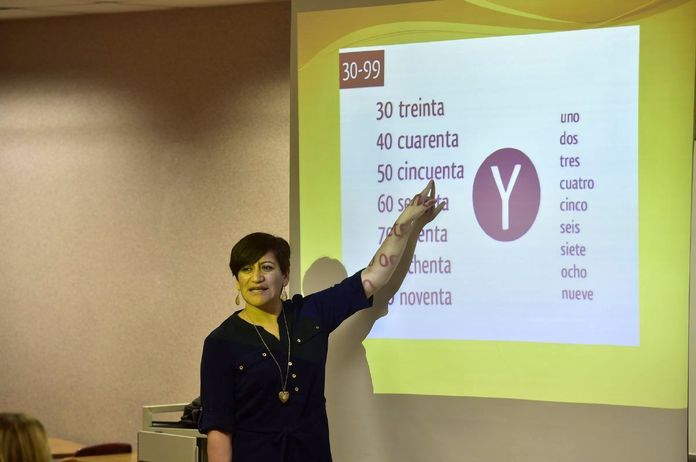By Lori McDonald 8/19/21
A local coalition has been working diligently to put Jackson County residents on the path to better health.
The Healthy Jackson County coalition focuses on four key areas: Improving nutrition, decreasing tobacco use, increasing physical activity and health care for the Hispanic population.
Bethany Daugherty is the key coordinator of the coalition and a health and wellness education specialist at Schneck Medical Center in Seymour.
The Hispanic health task force was created in May 2020 as a response to the COVID-19 pandemic and the disparities being seen, affecting the Hispanic community.
“Members of this task force are specifically working toward reaching the Hispanic members of the community and making information available in their language,” Daugherty said.
During a Zoom meeting Wednesday, three members of the Hispanic Health Task Force held a discussion panel. There are currently about 22 members in that work group.
Whitney Amuchastegui, executive director of Su Casa Columbus, said the vision of her organization is to build a thriving and valued Latino community that benefits all of us.
“I stress ‘all of us’ because it’s not just about the work we do with the Latino community,” she said. “It’s also about what we do with the greater community and how we can advocate on behalf of the Latinos, but also really make sure that we have a thriving community overall.”
Su Casa is a certified United Way agency working in both Bartholomew and Jackson counties.
“Over the last 10 years, the population of the Latino community in both counties has grown tremendously,” Amuchastegui said. “It now represents about 35% of the school population in Seymour Community Schools and 16% in Bartholomew Consolidated Schools.”
She said that can really affect the culture and the community as a whole and how we can grow and prosper.
“When Su Casa first started about 20 years ago, people would call and ask us questions about how to get in touch with the school systems or the hospital, and we’d refer them to other agencies,” she said.
Now, the organization is increasing in-house programming, such as assistance with rent and utilities, and now offering that to residents of Jackson County.
“We do translation and interpretation, have notary services and participate in various programs around the community to get school supplies and Christmas gifts to needy children,” Amuchastegui said. “We also have coaching where our staff works one-on-one with families to make sure they have a good understanding of how to support their families in their financial stability, education and health specifically.”
She said it has become clear that health and access to health care really need to become a high priority, equal to education, which used to be the main priority.
“We’ve been trying to communicate to other agencies how the language barriers have been undercommunicated over the last several years,” she said. “The peer-to-peer education is really essential, and that is how we were able to achieve a lot of what we did during the pandemic.”
Over the course of four months, Su Casa was able to serve 500 families with rent and utility assistance and also food baskets, which they no longer have since they now often rely on food pantries in the area.
Amuchastegui said they do the peer-to-peer education through a program called Vecinas de Enlace, where trained volunteers in local neighborhoods serve as a first point of contact for their clients.
“Vecinas translates into neighbor, and we have seven of them around the area and serve as what I call super volunteers,” she said. “This is a program we’re currently expanding to Jackson County, and we hope it will be able to grow over the next couple of years.”
Right now, there are seven vecinas across the two counties who help identify needs and work with individuals to keep them connected to the community.
“The vecinas serve as our boots on the ground and are able to communicate with our neighbors about all of the services that not only we provide but other agencies, as well,” Amuchastegui said. “This is also a way for us to identify individuals in need, and we used it a lot at the height of the quarantine. We continue to do so as we serve other families who are suffering from the pandemic.”
Amuchastegui encourages other agencies to reach out to Su Casa to make sure the vecinas have that resource information available as the program grows in Jackson County.
Edwin Flores, Hispanic ministry coordinator for St. Ambrose Catholic Church in Seymour, also was a member of the panel. He said the ministry started in the mid-1990s.
“Then we incorporated a Hispanic ministry and had our first bilingual Mass around that time,” he said.
He said as the Hispanic population has been growing, they have seen that in many of their churches. Currently, St. Ambrose holds a bilingual Mass at 12:30 p.m. Sundays and 5:30 p.m. Thursdays.
“The whole point of our church and something that our priests emphasize is the bilingual community that we have,” he said. “Just because we have a Hispanic ministry or a Hispanic community, this doesn’t mean that we separate ourselves from our whole parish.”
He said St. Ambrose has a sense of connectiveness and community in all of the parish, not just among Hispanics.
“Apart from that, something we’re very proud of here at St. Ambrose is being a part of this task force because we have a lot of parishioners that are Hispanic that are also Catholic,” he said. “So we wanted to help them and help the overall Hispanic community that we have.”
Through the task force, St. Ambrose was able to host a COVID-19 vaccine clinic in the school gymnasium.
“At our Hispanic ministry here at St. Ambrose, we have a great Hispanic population, and if any organizations would like to be present to that Histrionic population, we can help you connect to those people,” Flores said.
He also announced he is leaving his position at St. Ambrose has been accepted into the Master of Science in medical science program at Indiana University School of Medicine. Agniliz Gonzales has been hired as his successor.
The final panel member to speak was Ana De Gante, director of English learner services for Seymour Community School Corp. She said the district’s goal is to welcome students who have English as their second language.
“Also to help with their academic growth by providing guidance, translation assistance and assuring they receive what is necessary for them to be academically successful,” she said.
The school website offers notifications and information in Spanish for all Latino families.
“I also work closely with parents to inform them of the benefits our schools can provide to them by becoming involved as a parent volunteer,” she said. “One of the barriers with our parents is communication, so I am also in charge of providing English classes to parents at two of our elementary schools.”
Last year, due to the pandemic, they weren’t able to have those classes, but she hopes they can this year.
“I think it is necessary for our school parents to learn English so they can better help their students with their homework, education and also become more familiar with the school environment,” she said.
Since joining the Hispanic Health Task Force last year, De Gante said it has been a great help.
“We have been able to work together to provide help in a critical and challenging time such as the pandemic,” she said. “This team has been a great benefit to our students and parents.”
Because of the task force, she said Hispanic parents and students were informed about the risks of the pandemic and the importance of the vaccine.
“Recently in conjunction with St. Ambrose, we have had clinics for the COVID-19 vaccine,” she said. “As a school, we have been able to provide translators who speak English, Spanish and the most popular dialect in Guatemala culture.”
De Gante said those high school students have not only joined a team to help provide translations, but they have realized many families have not been vaccinated, and they were happy to be able to help them.
“They have also mentioned to me they felt not only welcomed but included as a part of the school system and the community, and I am so proud of them,” she said.
The next Healthy Jackson County Coalition meeting for all members will be 11:30 a.m. Nov. 10.
For the original article click here.

